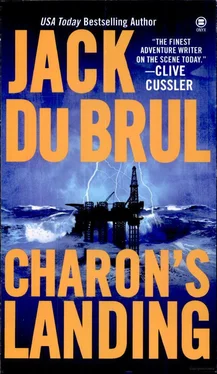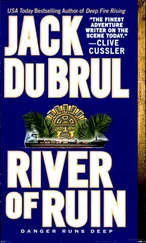Jack Du Brul - Charon's landing
Здесь есть возможность читать онлайн «Jack Du Brul - Charon's landing» весь текст электронной книги совершенно бесплатно (целиком полную версию без сокращений). В некоторых случаях можно слушать аудио, скачать через торрент в формате fb2 и присутствует краткое содержание. Жанр: Триллер, на английском языке. Описание произведения, (предисловие) а так же отзывы посетителей доступны на портале библиотеки ЛибКат.
- Название:Charon's landing
- Автор:
- Жанр:
- Год:неизвестен
- ISBN:нет данных
- Рейтинг книги:5 / 5. Голосов: 1
-
Избранное:Добавить в избранное
- Отзывы:
-
Ваша оценка:
- 100
- 1
- 2
- 3
- 4
- 5
Charon's landing: краткое содержание, описание и аннотация
Предлагаем к чтению аннотацию, описание, краткое содержание или предисловие (зависит от того, что написал сам автор книги «Charon's landing»). Если вы не нашли необходимую информацию о книге — напишите в комментариях, мы постараемся отыскать её.
Charon's landing — читать онлайн бесплатно полную книгу (весь текст) целиком
Ниже представлен текст книги, разбитый по страницам. Система сохранения места последней прочитанной страницы, позволяет с удобством читать онлайн бесплатно книгу «Charon's landing», без необходимости каждый раз заново искать на чём Вы остановились. Поставьте закладку, и сможете в любой момент перейти на страницу, на которой закончили чтение.
Интервал:
Закладка:
Mercer fell to the ground at the same time as Jamal, the alcohol, shock, and fear draining his strength. Darkness crept into his mind, cutting his vision down to a haze-filled tunnel. Even the lights that had snapped on in response to the shot were just distant points, fading even as more of them lit the street. He laid his head against the cold concrete as a siren began to wail someplace in another reality.
“You’re dead, aren’t you, Howard? They got you already,” Mercer mumbled to the cement before he passed out.
Alyeska Marine Terminal Valdez, Alaska
Under the glare of sodium arc lights, the hull of the Petromax Arctica was even darker than the water of Prince William Sound. The sun had not yet set in the northern latitudes though it was past nine at night. Despite the umber light, regulations demanded that the lamps high up in the oil gantries be on at all times. They bathed the VLCC (Very Large Crude Carrier), bringing out harsh shadows on her huge deck.
The ship was more than a thousand feet long, but what truly made her seem unworldly was her width. With a hundred-and-fifty-seven-foot beam, she was nearly as wide as a city block was long. Her red-painted deck was as large and flat as a parking lot, broken only by inspection hatches and a raised catwalk that ran nearly a quarter of a mile from her superstructure to her blunted bows. The tanker’s superstructure was a slab-sided white box at the very stern, rising fifty feet over the deck. Cantilevered promenades wrapped around a few of its levels, and the wings of the flying bridges hung over empty space on each side of the ship. Her single funnel sat foursquare in the center of the superstructure. The emblem of Petromax Oil, a stylized oil derrick with the intertwined letters P and O, was lit by a floodlight just below the twenty-foot-tall standard.
Unlike any ship in history, supertankers, as VLCCs had been dubbed by the media soon after their debut, defy nearly every law of naval architecture. Because of their size, they cannot be built like a traditional vessel with a laid keel and massive steel supports rising up like ribs from the backbone. Tankers must be built in sections, each one floated independently and welded together in the water. According to the engineers, tankers are safe, yet they still tend to break up when nature or man’s own folly stresses them too much. They are a bastard creation, spawned by an oil-thirsty world with little regard for how that thirst was slaked.
The Petromax Arctica was a modern-generation supertanker, only three years old, double hulled and built with the latest inert gas scrubbers and other safety devices. But the most recent evolution of a dangerous idea was still dangerous. Therefore, Captain Lyle Hauser treated his ship as if she were a floating bomb with a lit fuse.
Hauser stood one hundred feet over the sound on the port wing of the flying bridge, feeling his ship settle as North Slope crude poured into her compartmentalized hull at a rate of twenty thousand barrels every hour. He’d been up there since the armored hoses of loading berth number three had started disgorging the oil hours earlier. Pulled from retirement for this trip, this was his first time on a tanker of this size and he wasn’t going to allow even a minor deviation from procedure. If that meant he had to stand on the flying bridge and watch the gantries automatically pump oil into his ship for the remaining hours of loading, so be it. It was a ritual he’d acquired as a lightering tanker captain. Some superstition, deep in the back of his mind, told him that if he didn’t watch the entire loading process, disaster would surely strike.
The loading system was a direct feed linked through the ship’s computer, so there was no chance for a spill or the vessel losing her center of gravity, yet Hauser could still smell the heavy stink of crude oil and feel the great behemoth below his feet shift as the internal pumps transferred crude between the compartments to keep the Arctica level.
He pulled a walkie-talkie from the deep pocket of his pea coat. “Riggs, how’re the oxygen levels in the tanks?”
“Showing five percent across the board.”
While oil is one of the most combustible substances on earth, it can only burn within a narrow ratio of gases. Too much or too little oxygen and it will not ignite. Because her main engine produced emissions in the 12 percent range, the Petromax Arctica was outfitted with a separate Sun Rod boiler system that produced exhaust well below the threshold where oil is combustible. The Sun Rod’s emissions were piped directly into the tanks to maintain an inert level.
“And what’s the cargo level in starboard tanks one through three, please?”
“Twenty-seven percent. She’s loading even, Captain,” his First Officer responded.
Hauser knew that his ship was loading evenly; he could feel it with his wide-spaced feet. His request had merely been a test to ensure that Riggs was manning his station and attentive to his job.
Her job, Hauser reminded himself. Though she had a deep, almost coarse voice that came across the walkie-talkie as mannish, his Number One, JoAnn Riggs, was a woman, a nine-year veteran out of the Merchant Marine Academy in Maine.
Hauser hoped he’d get used to the idea of a woman under his command. Her dossier, which he’d read on his flight to Alaska, showed her to be a competent, disciplined officer. In fact, she had more time on supertankers of this size than he did. Yet there was something about her intense manner and constantly blinking eyes that he just didn’t like. After forty-five years in a career that led him to work with hundreds of people, Hauser had become an excellent judge of character. His first instincts usually served him well. He just did not like JoAnn Riggs. It had nothing to do with her gender; it was just her.
Hauser plucked a cheroot from its black and gold cardboard box, slipped the packet back into his coat, and pulled the thick wool back around himself to ward off the unseasonable cold. He automatically reached into his pants pocket for his lighter, an inscribed Zippo from his wife, but it was locked in his desk in the captain’s day room. He’d quit smoking the cigars over a year ago but kept the lighter with him. It was under lock and key, not as a safety precaution but as a deterrent from ever lighting one of the five cigars he chewed each day.
“Damn Surgeon General and his ridiculous warnings,” he muttered.
As he thought about it, Hauser realized that he didn’t care for the three other ship’s officers he’d met this morning. Because of the tremendous fortunes tied up in tankers and their cargoes, men had to accommodate the ships rather than the other way around. It was common for new crew members, including captains, to meet their new ships in out-of-the-way places like the Persian Gulf or Cape Town or Alaska. There was no time for crews to get acquainted before the ships were back at sea. Depending on the circumstances, crewmen were sometimes choppered out to the tankers while they were under way, adding to the isolation in which these leviathans existed.
It was one of the many dehumanizing effects on ocean commerce Hauser had watched develop over the decades. The industrialized world had put itself on such a rigid schedule of supply and demand that tankers and their cousins, bulk carriers and container ships, simply became another part of the assembly line. To those who owned them and to many of the new generation that worked them, the world’s merchant fleets no longer elicited the emotional responses that they’d commanded a half century before. They’d become just one more cog in the great industrialized machine.
Maybe that was why Hauser didn’t like the crew he would command until the ship docked at the El Segundo refinery north of Long Beach. They were part of the new generation. They saw what they did as jobs, not callings, as he had when he went to sea at sixteen. Hauser wondered if he was just being harsh. Maybe his wife was right, that he shouldn’t have allowed himself to be coaxed out of a quiet, dull retirement for one last command. Even if he could accept a woman as a bridge officer, progress might have passed him by, leaving him longing for the old traditions that were gone for good.
Читать дальшеИнтервал:
Закладка:
Похожие книги на «Charon's landing»
Представляем Вашему вниманию похожие книги на «Charon's landing» списком для выбора. Мы отобрали схожую по названию и смыслу литературу в надежде предоставить читателям больше вариантов отыскать новые, интересные, ещё непрочитанные произведения.
Обсуждение, отзывы о книге «Charon's landing» и просто собственные мнения читателей. Оставьте ваши комментарии, напишите, что Вы думаете о произведении, его смысле или главных героях. Укажите что конкретно понравилось, а что нет, и почему Вы так считаете.












